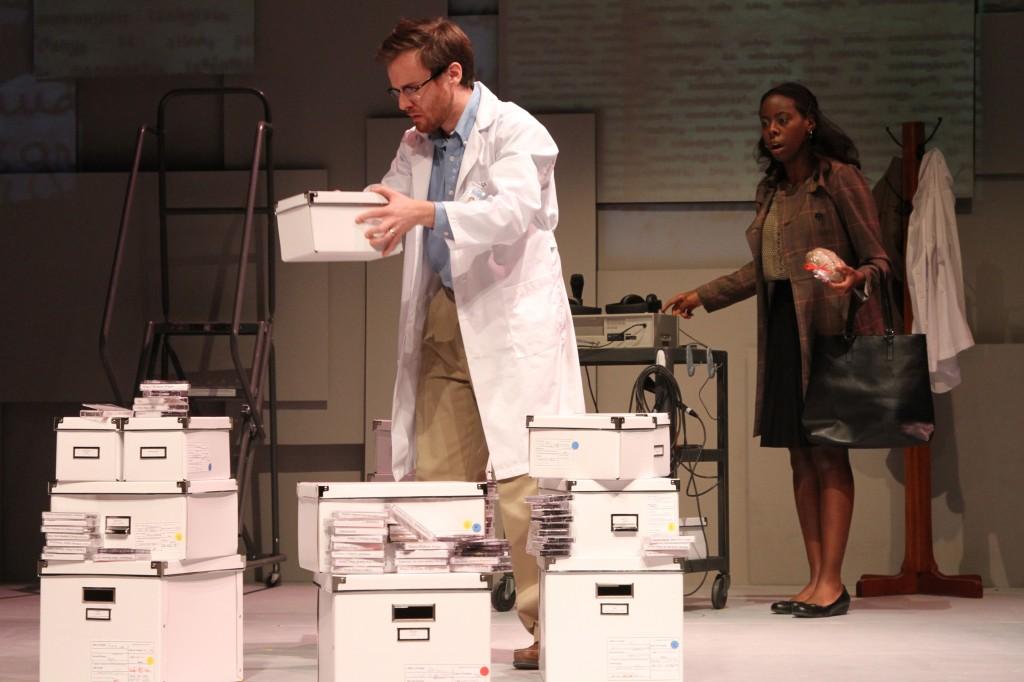To Say or Not to Say?
Discovering the Complexities of Love and Loss on the Mainstage
November 15, 2012

Students struggle to find the right words every day—while writing papers, during a job or internship interview and when formulating answers to questions in class. The characters in the new mainstage production, “The Language Archive,” struggle with word placement too, but in a more abstract way.
The archive itself, where main character George, played by Chris Stahl, Fordham College at Lincoln Center (FCLC) ’13, works, has no issue with words; in fact, it is full of them. It continues to gather words as this man, who has dedicated his entire life to the project, loses sight of his own ability to find the right things to say when his wife leaves him.
Discussing his character George, Stahl said, “It’s kind of ironic that he speaks so many languages and yet he has no idea how to communicate like a normal human being, until it finally just spills out of him all at once.” Indeed, a lot of the play is spent following George’s struggle to say something that he just cannot express. He embarks on an emotional journey that the audience is compelled to take with him.
Stahl said, “He really goes through the seven stages of grief in two hours, and that’s pretty exhausting.” It is for the audience as well, but its George’s endearing nature and naiveté that keeps them involved.
Other characters include Resten and Alta—respectively played by Patrick Dooley, FCLC ’14, and Sarah Spring, FCLC ‘13—two foreigners flown in to record their almost extinct language. These two provide the comic relief throughout the show; through bickering and overdramatic statements.
The actors who play them portray other characters as well. Dooley also plays a suicidal man saved by George’s wife, Zamenhof (an apparent creator of a language), and a passerby. Spring tackles the role of a language instructor, a passerby and the train conductor. These stories all intertwine to create a complex narrative, carefully and slowly revealing the emotions and outcomes of the characters throughout.
This is intentional—assistant director Riley Teahan, FCLC ’13, said, “Julia Cho’s script specifically calls for the double casting of these roles. I think it is a comment on the coincidental nature of human relationships. These characters seem to say the right thing at the right time.”
Needless to say, communication plays a huge and obvious role in this show, which is evident even in the set design. Teahan said, “We were interested in the many layers of communication, and how they could visually manifest in the play.” The result is effective, for the set is full of interlocking and overlapping squares and rectangles. Images of letters, languages, train signs and schedules are projected onto these pieces throughout the play, depending on where the characters are. The music played during the show is comprised mostly of lines from the play recorded by the actors and remixed.
Even the way the two foreigners are dressed follows this style of cutting and mixing. Teahan said, “Alta and Resten’s costumes are made up of pieces from all different cultures.”
Maggie King, FCLC ’14, who plays opposite Stahl as his soon-to-be-estranged wife Mary, said of the show’s director Tamilla Woodard, “She came in with a clear idea about the world of the play, but allowed us to build it as an ensemble.”
This proves to be an important way to work on a play full of such complex emotions. The actors completely shine throughout the entirety of the play, keeping the audience compelled and connected to them.
In addition to the play’s comments on communication, the characters also come to represent different forms of love. Love is truly everywhere— from George’s assistant Emma, played by Winter Dunn, FCLC ’14, falling in love with George, to Resten and Alta’s love for one another, to George’s unrequited love for Mary and his very strong passion for preserving soon-to-be dead languages.
Stahl said of the script itself, “Cho wrote a script that reminds me of a fable, it’s very dream-like and yet, like any good fable, has something very down to earth about it that resonates with the audience. And that’s love — the good and the bad.”
As the program thoughtfully stated, “For what is language, if not an act of faith?” The same could be said about love, as the characters all struggle to figure out how much faith they have in one another.
Regarding this and the big question of love, Stahl said, “I think I know a lot of people [like George] come to think of it—I think everyone can attest to having problems articulating their emotions at one point or another in their lives.”
In addition to being enchantingly entertaining, the play is thought provoking as well. It may have you thinking of those times when you weren’t able to express what you wanted to say.








